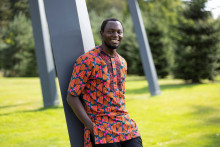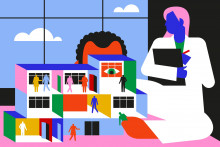‘Let me start by saying that the UT is quite diverse in terms of nationalities. When I was a PhD student, one of the highlights was making friends and learning about people from many different countries. But in case of diversity of race and inclusion, there is still room for improvement. It is not just enough to be diverse; it is equally important for everyone to feel at home at the university. I felt very much at home at the UT during my PhD, even though there were very few black students on campus. The research group I worked in created an ambience that gave everyone a voice and that encouraged participation, irrespective of who you are or where you are from. We had coffee and lunch breaks together, and even the professors joined in.
Bitter experiences
Adjusting to a new country and a new culture is always very hard. An inclusive environment can make a huge difference. That is why the day-to-day working environment in research groups is essential. My own good experiences also ensured that I now act as an ambassador for the UT: I tell people that the UT is a good place to go. Unfortunately, this is not the reality of some of my African colleagues. And we should tell their stories as well. I have heard about their bitter experiences with colleagues and sometimes professors. They experienced both covert and overt racism, subtle and direct insults, passive aggression, and bullying.
The situation is particularly challenging for PhD candidates. Their research has its own challenges and difficulties, and it is a lot heavier when people have to combine the workload with the negative attitude of their colleagues, combined with loneliness, homesickness, adjusting to the Dutch culture and weather, and many other factors.
Amongst several biases, minorities are often faced with attribution bias. This happens when actions or behaviours are misinterpreted. Minorities are more likely to face this because they might have habits that are different from the Dutch or other nationalities. For example, a friend of mine once gave a passionate presentation about his own research and his gestures were interpreted by a colleague as aggressive and angry. I found this ridiculous. We can prevent this bias by not making too many assumptions, and by accepting that people from different backgrounds sometimes do things differently. Try to look at others with an open mind and do not judge too quickly.
Difficulties
I too have encountered difficulties in my academic career. For example, when colleagues expect me to prove my abilities, which I find surprising because this is not expected from other non-black colleagues. You are often not believed when you say something, but when a non-black colleague says exactly the same, they believe them immediately. I try not to let it bother me too much and continue to do my job as best as I can, hoping that they will be enlightened at some point.
In some cases, it led to colleagues spreading gossip and rumours about me, which in turn led to exclusion by others. When doing experimental based research, this is actually a big problem. We often need to collaborate and work together. But in a toxic environment, working together is very difficult. It requires a lot of inner strength and motivation to survive, and this has happened to me and other minorities, which is, of course, very sad.
A platform for discussion at the UT, where people share their ideas and experiences, could help. But action is also needed. In this case, I think the UT should come up with tailor-made solutions. We shouldn't copy other universities. I myself am working on a mentorship and counselling initiative where we can help PhDs from a minority group by linking them with senior researchers from similar backgrounds for support. Allies are also very important. If something unacceptable happens in a group, or somewhere else on university, someone has to speak up. This will make you feel supported.
I remember that during my PhD, there were only two Africans in the building where I worked, and that includes myself. The other guy also happened to be from Nigeria. When we saw each other in the corridor, we often had good and long conversations. It felt very nice to see someone that looked like me. Besides the feeling of identification, diversity is also good for the university in general. Several studies prove that diversity improves creativity and the overall output.’
profile
Femi Ojambati grew up in Nigeria, where he studied physics/electronics. He won a scholarship for his master studies at the Abbe School of Photonics, University of Jena, Germany. Ojambati completed his PhD (cum laude) in 2016 at the Complex Photonics Systems group at the University of Twente. He was awarded a Rubicon fellowship to fund his postdoctoral research at the University of Cambridge. In January 2021, Ojambati started as a tenure track assistant professor at the UT and he is currently setting up an independent research group at the Nanobiophysics group within the Soft Matter and Applied Nanophotonics clusters.







